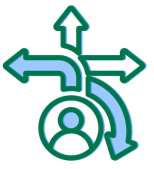
Courses approved for inclusion into Pathways must address specific learning outcomes established by CUNY. A list of these outcomes is available in the Handbook’s Appendix. Each college throughout the University has discretion as to how to approach the assessment of Pathways’ outcomes and BCC, like several other colleges in the University, has elected to develop overarching “competencies” to help facilitate assessments of the flexible and common core outcomes. Each competency was approved by the BCC Assessment Council and reviewed through BCC governance–Curriculum Committee and College Senate–and is closely aligned with Pathways’ learning outcomes. BCC’s six Gen Ed competencies are:
- Communication
Communicate effectively in various forms. - Critical Thinking
Evaluate evidence and arguments critically and analytically. - Quantitative Reasoning
Reason and solve problems using quantitative evidence in various fields of interest and in everyday life. - Scientific Reasoning
Apply scientific methods and reasoning to investigate issues/problems in the natural and social sciences in order to draw conclusions and create new knowledge. - Digital Technology Competence
Acquire the necessary knowledge and skills to use a wide array of technological tools. - Information Literacy
Gather, interpret, and assess information from a variety of sources and points of view.
General Education Assessment Process (tentative)
Each competency is assessed vis-à-vis a rubric, that was developed and agreed to be used by BCC’s faculty for the purpose of assessing the College’s Gen Ed program. The process and timing of the assessments are established by the BCC Assessment Council. Below is a brief description of the process:
- Selection of Courses
In the spring semester preceding the scheduled assessment, staff from the Office of Assessment will randomly select courses aligned with the competency being assessed. Instructors assigned to selected courses will be notified that they have been randomly chosen to participate in next year’s general education assessment project. - Selection of Students
At the conclusion of the third week of the semester in the fall semester (roughly mid-September), the Office of Assessment will randomly select students from the pre-selected courses in Step 1 and will instruct the faculty from these sections to submit student artifacts and their corresponding assignment to the Office of Assessment at the conclusion of the semester. - Review of Artifacts
During winter and the first half of the spring semester, submitted artifacts are reviewed by a team of faculty reviewers. Each artifact is reviewed by two evaluators using the rubrics created by BCC’s faculty for each of the competencies described above. - Aggregating and Reporting the Results
Results of the assessments are aggregated across multiple courses by OA staff and a report is prepared by the Office of Institutional Effectiveness. Results are shared with the Assessment and Council and other College stakeholder groups in the spring. The results are used to inform action plans for the following year.

